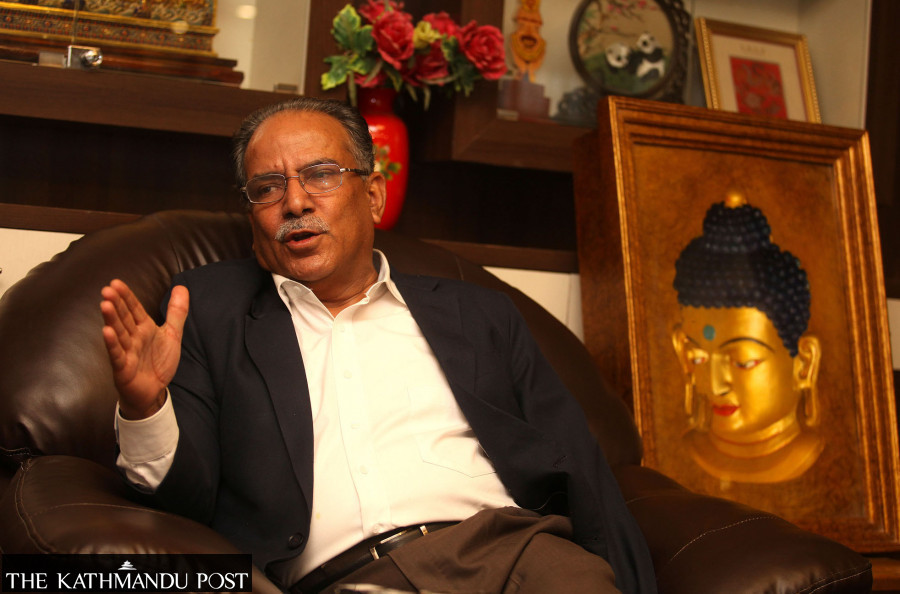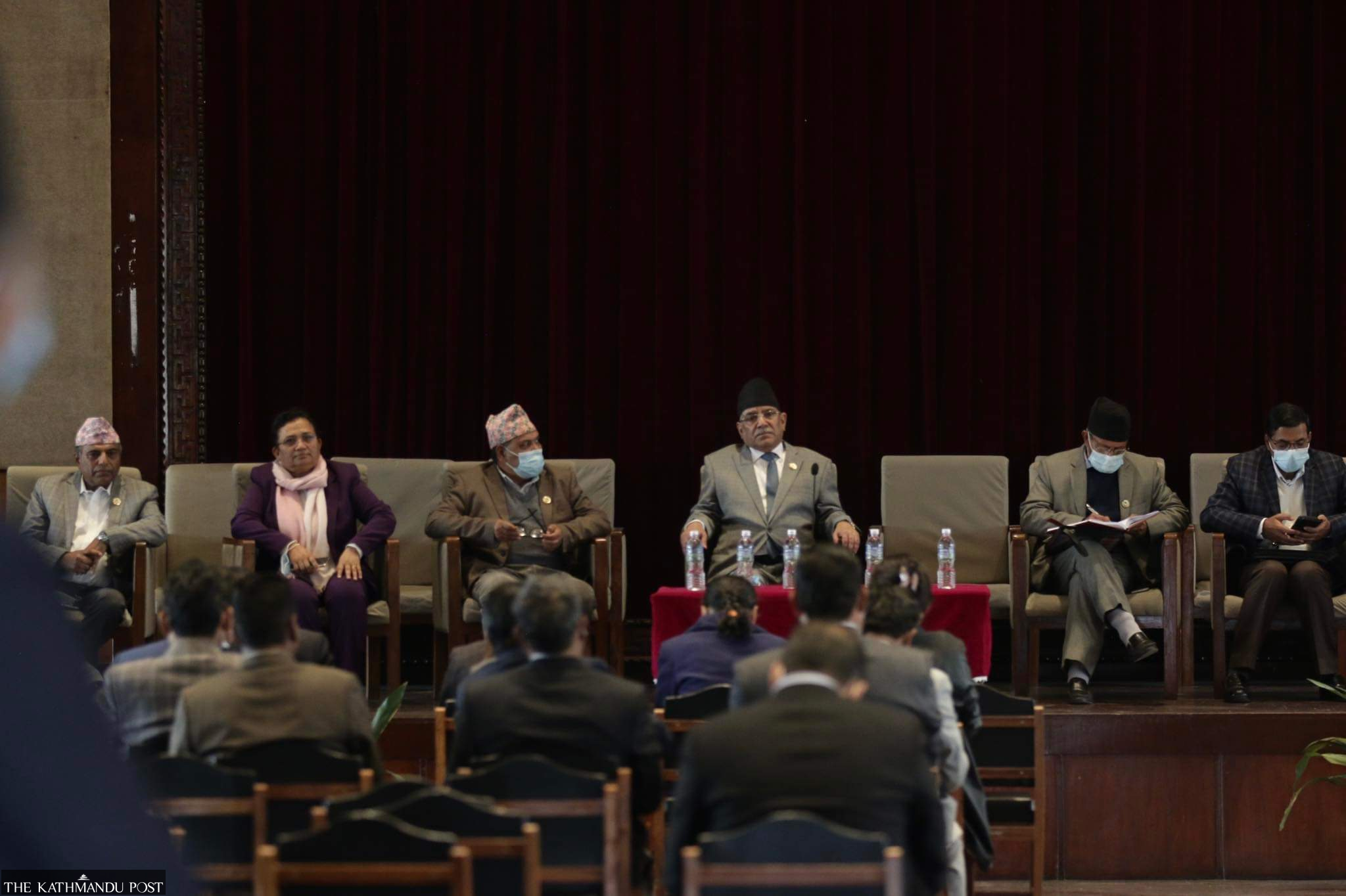
He threatened to break the coalition. He deployed his party's sister wings on the streets to protest against tabling and ratification of the Millennium Challenge Corporation Nepal Compact. He upped the rhetoric that his party would quit the government.
And on Sunday night, he voted to ratify the compact.
A day later, on Monday, he said he is extremely happy that the compact has been ratified by Parliament along with the interpretative declaration.
Over the last few years, Maoist Centre chair Pushpa Kamal Dahal’s vacillation over the $500 million grant has been known to all.
“I'm very happy after its (MCC) endorsement. The country has been saved from an accident. The constitution has been saved,” Dahal said at a press meet organised at his residence in Khumaltar on Monday. “I don’t think saving the coalition is a big issue.”
It was, however, Dahal and his party and his party members who for the last few months, since January 2020, cried foul at the US grant, saying some of its provisions undermine national sovereignty and that the compact is above Nepal’s constitution.
When Dahal was co-chair of the then Nepal Communist Party (NCP), formed in May 2018, he had formed a three-member task force led by Jhalanath Khanal with Bhim Rawal and Pradeep Gyawali as members.
The panel had given strong opinion against the MCC compact, recommending that it should not be passed without amendments. Both Khanal and Rawal, who had launched a struggle against another NCP chair, KP Sharma Oli, were—still are—the most vocal critics of the compact. After the NCP was invalidated last year in March, Dahal got his Maoist party back. Khanal in August last year decided to break away from the UML along with Madhav Nepal and is currently in the CPN (Unified Socialist). Rawal continues to remain in the UML.
As most of the Maoist members made an issue of the MCC compact, it had become apparent that it was at Dahal’s behest, as he was weaponizing the US compact against Oli. In doing so, he, however, had made a rod for his own back.
After the coalition government led by Nepali Congress President Sher Bahadur Deuba was installed, he had to maintain his anti-MCC stance—at least in front of his party cadres—just while he was in no position to oppose ratification.
Dahal on Monday defended the move to support MCC ratification, saying the interpretative declaration was brought after several experts on international law including Arjun Bahadur Thapa, former secretary general of South Asian Association for Regional Cooperation, said that it will have legal recognition which was also approved by other legal experts including Govinda Bandi.

Elite Joshi/TKP
“We moved ahead after knowing that it won’t be like [the resolution motion passed during] the Mahakali Treaty,” Dahal said. “Now the US should accept the interpretative declaration or else it will be annulled automatically.”
The interpretative declaration was hashed out at a Saturday night meeting between some leaders of the Nepali Congress, Maoist Centre and the Unified Socialist.
Most of the points in the declaration are similar to those concerns raised by the Finance Ministry in September last year before the MCC headquarters and its subsequent response.
At least four senior leaders of the Maoist Centre, however, have rejected the declaration and opposed the party’s move of supporting ratification.
Narayan Kaji Shrestha, Krishna Bahadur Mahara, Giriraj Mani Pokhrel, Lila Mani Pokhrel and Dev Gurung opposed the idea of ratifying the compact even with the interpretative declaration.
But Dahal, during the press meet, said Gurung had no reservations about endorsing MCC with the interpretative declaration and that he was following the party’s decisions.
“Though Dev Gurung followed the party's decisions, Shrestha went to the public as if all the people would rally behind him for opposing the MCC,” said Dahal. “After the Mahakali Treaty, Bamdev [Gautam] had split the [UML] party with half of the leaders saying that it was betrayal to the nation, but they received zero votes in polls,” added Dahal insinuating that even if some leaders quit the party they have no political future.
A Maoist leader, however, said Dahal thinks everything will be alright if the current coalition remains intact.
“If Dahal was thinking of endorsing the MCC compact with the resolution motion which came in the form of the interpretative declaration, why was this drama at the party’s general convention and also on the streets,” said the leader who didn’t wish to be named.
By agreeing to ratify the MCC compact, Dahal may have managed to remain in the coalition—and by that extension in power—but some leaders within his party say things won’t be as easy in the coming days.
Even in his political document presented at the party’s general convention in late December, which he got endorsed, Dahal has included strong reservations about the American grant. That he was doing double-dealing was exposed when a letter he co-signed on September 29 last year with Deuba to the MCC was leaked. In the letter, both Deuba and Dahal had sought four-five months to build consensus on the grant agreement. The MCC headquarters accordingly set the February 28 deadline. The MCC response letter to Deuba and Dahal too were leaked.
Dahal on Monday, however, made light of a question regarding the duplicity he displayed. It was necessary to create pressure on ruling party leaders to prepare interpretative declarations, he said instead.
“If there was no such opposition and if such efforts were not made, we would not have arrived at this situation of ensuring this interpretative declaration,” said Dahal. “Due to the pressure on the streets, the US also took the interpretative declaration into consideration.”
Failure to ratify the compact by the deadline would have meant certain breakdown of the coalition, and Deuba was concerned about that, according to Congress leaders. But Dahal needed the coalition more than anyone else. For the Unified Socialist, led by Madhav Nepal, the options were even more limited.
So, after Dahal decided to support MCC ratification taking the cover of the interpretative declaration, the Unified Socialist followed suit. Khanal of the Unified Socialist, however, maintained his tough stance against the compact, even during the voting on Sunday night.
Dahal took pains on Monday at the press meet to justify his changing stances on the MCC compact.
“For many days I was portrayed as a villain or someone doing double-dealing after the joint letter written [by me and the prime minister] to the MCC was revealed,” said Dahal. “Actually I was trying to build a national consensus as the society was polarised and democracy was at risk.”
The Congress which took the lead in passing the compact said Sunday’s ratification ensured that the coalition remains intact.
Congress spokesperson Prakash Sharan Mahat said on Monday that the coalition managed to clear confusions and misconceptions about the MCC compact.
"We want to work together to dispel doubts about the compact among the people,” said Mahat while addressing a press conference at party headquarters on Monday. “If the prime minister had not had the patience and not put in so much effort, we would not have achieved what we have.”













